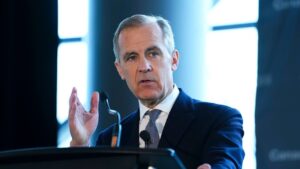
OTTAWA — The federal government has announced a suite of changes to the popular income and business support programs put in place during the pandemic and set to expire on Saturday.
Deputy Prime Minister and Finance Minister Chrystia Freeland reminded Canadians on Thursday that the measures were always
“We’re moving from the very broad based support that was appropriate at the height of our lockdown to more targeted measures that will provide help where it is needed while prudently managing government finances,” she said.
The changes come with a price tag of $7.4 billion.
The Canada Recovery Benefit (CRB) will be replaced by the Canada Worker Lockdown Benefit for those whose work is directly impacted by government-imposed lockdowns.
The program will be available until May 7, 2022, retroactive to Oct. 24, and will provide $300 a week to eligible workers – down from $500 a week through the CRB.
“Temporary lockdowns are still a possibility in the months to come. We want Canadians to know that we intend now to put in place measures that would snap into action immediately,” Freeland said.
As of Oct. 10, the government had paid out $27 billion to more than two million unique CRB applicants.
Freeland also announced the implementation of two new programs to help hard-hit sectors, replacing the wage and rent subsidies.
The Tourism and Hospitality Recovery Program and the Hardest-Hit Business Recovery Program will be in place until Nov. 20, and when Parliament returns, the government is proposing to introduce legislation to have them extended until May 7, 2022.
The former, which would apply to operations such as hotels, restaurants, bars, festivals and travel agencies, requires applicants to show an average monthly revenue loss of at least 40 per cent for the first 13 qualifying periods of the Canada Emergency Wage Subsidy and a current one-month revenue loss of the same amount.
Until mid-March, 2022, the subsidy rate would reflect the revenue decline, up to 75 per cent, and then decline by half until the program’s expiration.
The latter program applies to those that don’t fit under the tourism and hospitality umbrella but are still facing significant financial hurdles caused by the pandemic.
Eligible businesses would have to show an average monthly revenue loss of at least 50 per cent over the first 13 qualifying periods of the Canada Emergency Wage Subsidy and a current one-month revenue loss of the same amount.
The maximum subsidy rate would be set at up to 50 per cent until mid-March and then reduced by half thereafter.
The government will also extend the Canada Recovery Hiring Program, for businesses that can show a more than 10 per cent revenue loss, until May 7, 2022 at a subsidy rate of 50 per cent paid to eligible employees.
The Canada Recovery Sickness Benefit, and the Canada Recovery Caregiving Benefit will remain in place until the same time and are being extended by two weeks – moving the sickness benefit from four to six weeks and the caregiving benefit from 42 to 44 weeks.
Mark Agnew, senior vice-president of policy and government relations with the Canadian Chamber of Commerce, says the retooled business support programs will allow companies that continue to be impacted by public health restrictions to survive until they can recover.
“This is the fair thing to do for businesses that are playing their part to protect public health,” Agnew said in a statement.
Reacting to the end of the CRB, Conservative MP Ed Fast attributed the announcement to leader Erin O’Toole’s pressure on the prime minister to phase it out.
“Yesterday, Conservative Leader Erin O’Toole said he would not support CRB benefits being extended past November 20th, citing skyrocketing inflation and ongoing labour shortages across the country. The Prime Minister followed Mr. O’Toole’s fiscal plan,” Fast said in a statement to CTVNews.ca.








